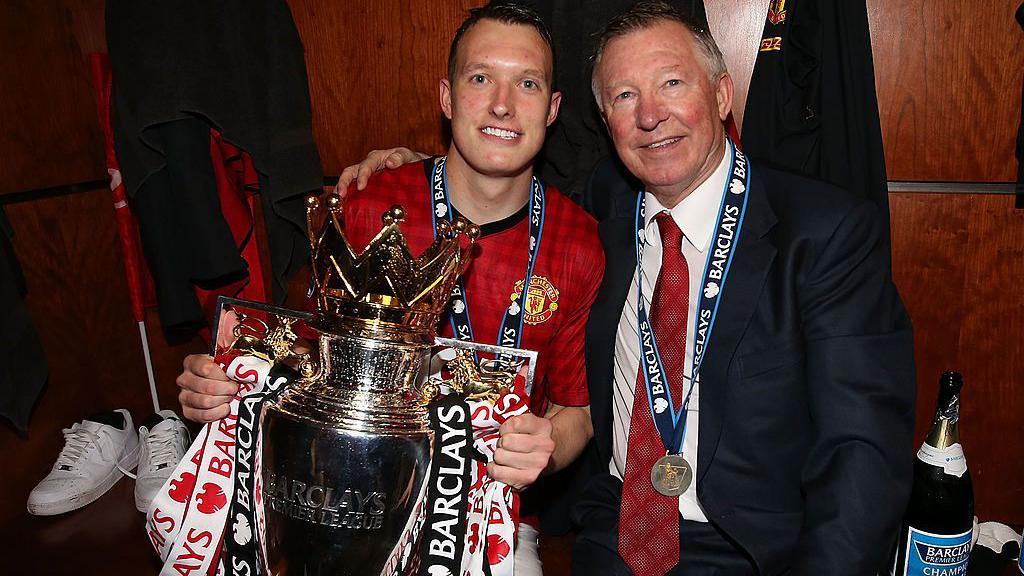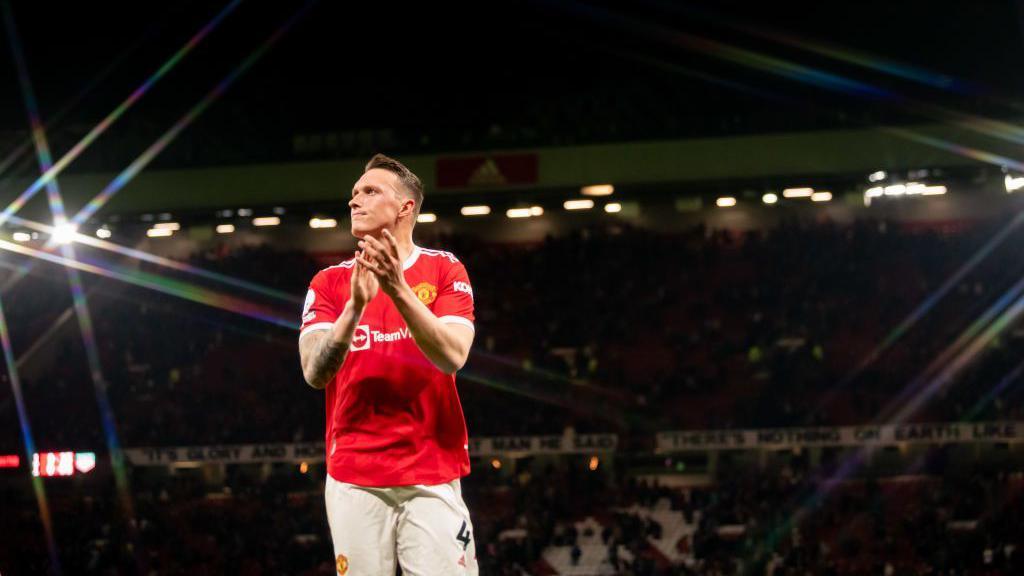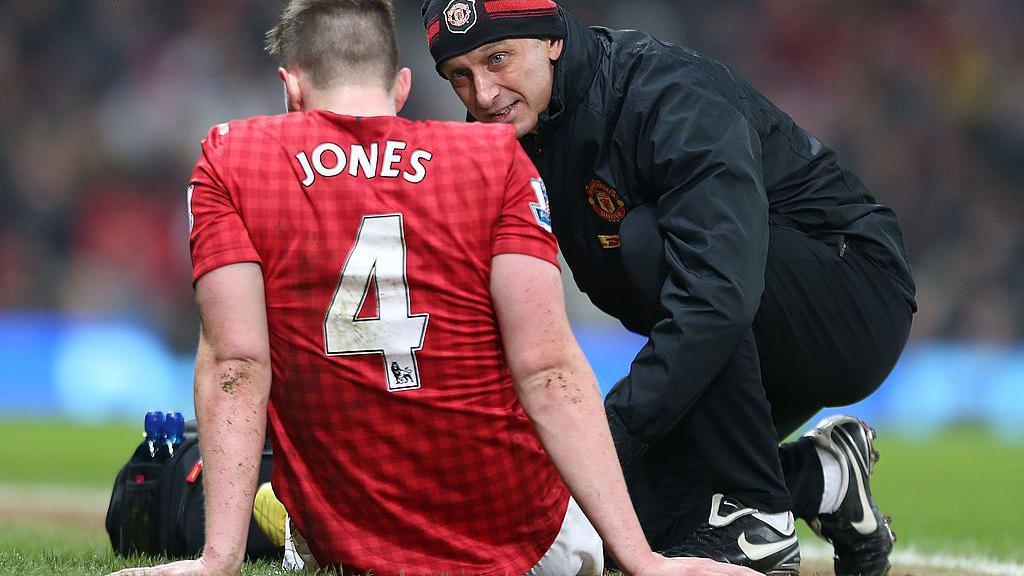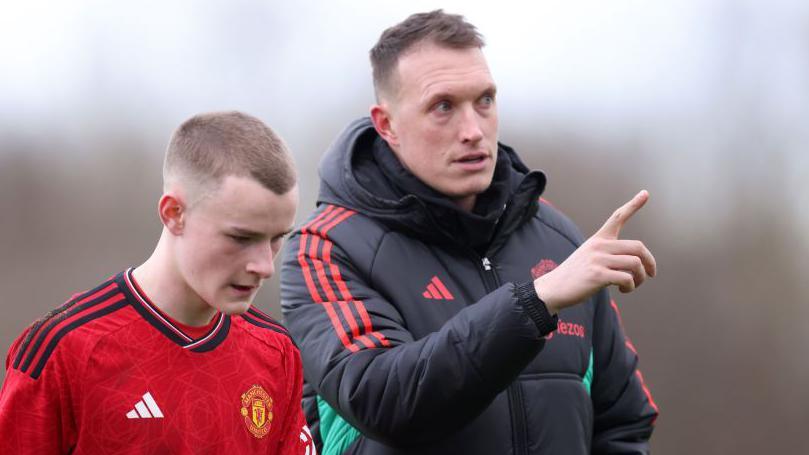'I had to strip everything back - now management is my focus'

- Published
No-one teaches you how to deal with the end of your playing career but, when it happened to me, I knew what I wanted to do next.
The way I was forced to stop playing football because of my knee injury was unfortunate, but it is one of the reasons I decided that coaching and, ultimately, management is the path for me.
I only announced my retirement in August but I knew for a while before then that I would be finishing. To come to terms with that, I had to re-evaluate everything and unpick myself personally and professionally, with therapists and psychologists, to find myself.
I've talked quite a lot recently about how that worked for me and helped me deal with the issues I faced mentally, but it's important for anyone reading this to know that the process is the same in every aspect of life, not just sport, if your circumstances change or things are not going well for you.
For me, that meant stripping everything back to understand who I was and where I wanted to get to next in life, and then thinking about the challenges I would face to get there.
Part of the purpose I have found is as a husband and a father, because I always wanted to be the best I could be at both for my family, but it applied to my future in football too.
It meant going away and trying to almost rediscover what had got me to that point in my career in the first place, and thinking about what I had actually achieved, before I was able to take the next step.
I have had some difficult times, but I am ready for anything now.
No 'shame' over successful career

Jones celebrates winning the 2013 Premier League title with Manchester United manager Sir Alex Ferguson
When you are playing you never really look back and reminisce about the good days, like the trophies you have won or big games you have played in, because it is always about the next game, and the next one after that, and so on.
Even when I was struggling to deal with being injured so often - and some of the abuse I was getting about it - I'd never really thought about the past and what I'd done in the game.
So, it was almost a case of saying to myself 'well done you', and finally showing myself that appreciation and being thankful for what I'd achieved, because I did not always think like that.
The example I always use to explain that change in my mindset is when someone came up to me at a railway station and said, "Oh it's a shame about your career". I was in a much better place by then, and responded by saying I disagreed because I had lived the dream, with my boyhood club Blackburn, then Manchester United and England.
I'd had lots of public situations like that to deal with down the years without responding in that positive way, and had often ended up just trying to avoid them.
It got so bad for a while that I would be walking down the street, worried about what people would say to me in case I got abuse, and thinking about what I'd say next. I just wanted to keep my head down when I was in a crowd, and it was the same on social media, which is why I came off it for a while.

Jones applauds the Old Trafford crowd at the end of his penultimate Manchester United appearance, against Chelsea in April 2022. He made the last of his 229 appearances for the club four days later, as a substitute against Brentford
If you knew me, you knew all I wanted was to be able to play football - but it is as if people thought I just woke up each morning and decided I was injured.
You want to say something back, especially when they said it to my face, but it has never been in my character to do that. I've always been humble and down to earth, and I've never taken myself too seriously.
So for me to feel that way was hard, and it would get to me. I was ashamed that I was injured, to the extent I didn't even want to speak to my team-mates, and I was embarrassed going into the club every day just for treatment.
It took a long time for that to change and for me to realise that, while I had lots of ups and downs in my career, ultimately I was proud of what I did as a player. I can look back on some unbelievable memories and I made some amazing friends for life.
That stage is over for me now, but I am just at the start of the next one.
I am only 32 and I know that I've got a long way to go as a coach or manager. Just because I played for United for so many years, it doesn't mean I can just walk into a job, but I am determined to get a chance somewhere.
It is something I feel passionate about and I feel I have so much to give with my knowledge about all aspects of the game, plus my drive to succeed even further in football because I missed out on two or three years as a player.
'I stayed silent through struggles and did not look for help'
Manchester United: Ten Hag praises Phil Jones despite only seeing him play for '20 minutes
I never fell out of love with football even when things were not going well for me, and I love coaching because I miss the buzz of being out on the grass, of being involved in and around the players, and helping them.
That applies to any level, for any team, but I really love watching young players come through and watching them develop because I have been there, and I know what it takes to make it in the game.
Off the pitch too, I can pass on my experiences of adversity and help to prepare them for what is coming - the peaks and troughs that every player goes through, and the mental challenges they will face to deal with all of that.
Players are not robots, they have feelings and emotions, and everyone is different, so I am not a teacher who is going to tell them they have to do exactly this or that.
But I have lived and breathed the game since I joined Blackburn aged 10 in 2002. I know the values that are important to me, and the standards that I would expect now - and also some of the advice that worked for me along the way, and the support I needed and did not always get.
Unfortunately there were times when I was at United when I did not look for help. My coping mechanism when I had any problems was to stay silent, and that was probably my downfall. I didn't open up to anyone, and I would hide my injuries from other players and the staff. I put a shield up so no-one knew what was going on, apart from my close family.

Jones receives treatment during Manchester United's FA Cup tie against Reading in 2013
I only spoke about this for the first time on a podcast last week, but one of my lowest moments was when I was trying to play through the pain of my knee injury, when it had got to a point where the doctor had to inject my knee before every game I played so I didn't feel it.
I was on the bench for a game at Brighton but one of our centre-halves was struggling in the warm-up, so I thought I would be pro-active and get the injection before kick-off.
It was embarrassing for me because I didn't want anyone to see that I was struggling, or in pain - I was meant to be a tough guy as a defender, remember - so I went into a cubicle in the changing room just as the manager started his pre-match talk, and got the doc to inject me in there.
It wasn't just me, because I know it is hard for any footballer to open up. But I'd hope if a player was struggling mentally, or was short of confidence like I was at times, then if I was his manager he would feel comfortable having that conversation with me, and he would feel he had a voice to speak to me, at least.
Any manager going into a job has to be bang-on tactically, but in the initial phase, when they have just taken charge, I feel it is just as important to command respect and, to get that, the players have to feel they can trust you.
If the players feel that, and think they have that love and support, they are going to speak to you honestly.
Some managers I played under did that well, and others not so well, but that’s what I'd be looking to establish if I am ever working with people on a day to day basis.
My coaching journey has already begun

Jones coached United's Under-18 team during the 2023-24 season
I learned so much from all the different managers I played for and the team-mates I played with, in lots of different competitions at club and international level. I have built up and stored all of that information, and feel I could use it to really help players and get them to the next level.
I’d like to think I’ve taken a bit from each manager and created my own coaching identity. I dislike the word 'philosophy' but I know the way I'd want my teams to play.
Like I say, though, from my own experience, what is paramount is an atmosphere and environment at your club where the players trust you and engage with you, and believe in what you are doing. If that isn’t there, then I don’t care how good you are tactically, because it won't make a difference.
There is a way of managing players and I think Sir Alex Ferguson did it best. He knew exactly how to manage, or micro-manage, every single player - the ones he could have a pop at, and the ones who needed a little bit of love.
I'd like to think that is something I will get bang-on as a manager too, because I think as a player, all you want is honesty - that's all I wanted anyway.
My coaching journey has started already because I worked with Manchester United's academy while I was completing my Uefa A Licence last season, which I really enjoyed doing.
There are three stages of getting on a Pro Licence course, which starts in January, and I am on the last part now. Hopefully that will be really good for me, not just from the point of view of developing as a coach, but as a networking opportunity as well.
I am looking forward to it because I am ambitious, I want to challenge myself and I love to put myself under pressure. I am itching to get involved somewhere in some capacity and hopefully, in a few years' time, I will be in a position where I can put all of this to the test.
Phil Jones was speaking to BBC Sport's Chris Bevan.